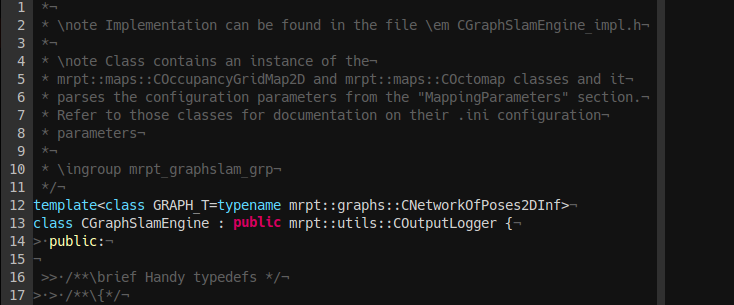C++ coding style for MRPT¶
General rules¶
Take a look at Google’s C++ style guide for very good general advises and reasons to worry about code style. It is worth reading carefully.
Since mrpt 2.0 we use C++17.
Class and filenames¶
For historical reasons, most MRPT classes and structures use the prefix C and T, respectively. For example: class CBar`and `struct TFoo. This convention should be observed in new code for the sake of consistency.
A class named CFoo should have its declaration in a file named CFoo.h and its implementation in CFoo.cpp. Pure template classes may have detailed implementations in CFoo_impl.h.
Each MRPT library, or “module”, has its own directory under MRPT/libs, with its own include and src directory. More on source tree layout here.
Use the #include guard #pragma once in new code.
Code content and style¶
Tabs vs Spaces¶
Prefer tabs to spaces. Yes, I know this is an eternal source of discussions and debate, but virtually all MRPT code follow this convention, so please respect it to avoid mixing whitespaces like in the following case:
More specifically:
Enable viewing of whitespaces in your editor of choice, e.g.,:
Visual Studio: ctrl+shift+8
Vim:
set listchars=eol:¬,tab:>·,trail:~,extends:>,precedes:< set list
Change the default editor settings so that you:
Use 1 tab for indentation
Use an additional tab for hanging indentation (e.g. for open parenthesis cases)
Use spaces for splitting words in the same line, aligning code snippets etc.
In the following example >. designates a tab character. If the latter is not there, a space is assumed.
Wrong indentation

Correct indentation

Wrong inline alignment

Correct inline alignment

Finally, if you are a vim-user you can add this snippet of code to your .vimrc to enable the aforementioned settings.
Misc¶
Never, ever, put a using namespace XXX; in a header file, since it will pollute without control user namespaces. An exception is its use inside the scope of a function implementation in a header, e.g. an inline function or method.
Member variables of a struct should have no suffix or prefix, e.g:
struct TFoo { int num_iters; };
Public variable of a class should have no suffic or prefix. Private/protected members should have the m_ prefix or, alternatively, the _ suffix. For methods, use lower camel case or K&R style, e.g.
class CBar { public: int num_iters; void doSomething(); // Lower camel case (preferred) void do_something(); // K&R style (second style option) private: int m_handle; };
In general, typedefs and using will use lowercase with underscores, e.g. using vector_int = std::vector<int>;
If a packed structure is defined (i.e. #pragma pack(push,1) … #pragma pack(pop)), it will be much safer to make all fields protected and offer accessor methods. In this way, we avoid alignment errors in some processor architectures.